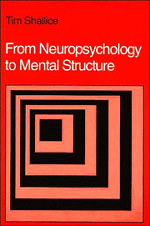Book contents
- Frontmatter
- Contents
- Preface
- I Introducing Cognitive Neuropsychology
- II Converging Operations: Specific Syndromes and Evidence from Normal Subjects
- III Inferences from Neuropsychological Findings
- IV Central Processes: Equipotentiality or Modularity?
- 12 Selective Impairments of Knowledge
- 13 The Allocation and Direction of Processing Resources: Visual Attention
- 14 The Allocation of Processing Resources: Higher-Level Control
- 15 Amnesia: What Is Memory For?
- 16 Modularity and Consciousness
- References
- Subject Index
- Author Index
- Index of Patients Cited
16 - Modularity and Consciousness
from IV - Central Processes: Equipotentiality or Modularity?
Published online by Cambridge University Press: 21 October 2009
- Frontmatter
- Contents
- Preface
- I Introducing Cognitive Neuropsychology
- II Converging Operations: Specific Syndromes and Evidence from Normal Subjects
- III Inferences from Neuropsychological Findings
- IV Central Processes: Equipotentiality or Modularity?
- 12 Selective Impairments of Knowledge
- 13 The Allocation and Direction of Processing Resources: Visual Attention
- 14 The Allocation of Processing Resources: Higher-Level Control
- 15 Amnesia: What Is Memory For?
- 16 Modularity and Consciousness
- References
- Subject Index
- Author Index
- Index of Patients Cited
Summary
The Relevance of Modelling Consciousness
There is an even more severe conceptual difficulty for the modular view of mind than how it can operate efficiently. The efficiency problem can at least be posed in a ‘mechanistic’ framework closely related to the framework in which ‘modularity’ itself is expressed. A more complex issue is why the human cognitive-processing system, which is apparently modular, should have the property of being conscious, unlike most modular systems – for example, present-day complex machines.
The obvious strategy within a modular approach is to identify some aspects of the operation of some particular module – say, its input – as conscious experience. However, one is then faced with the question of what could be so special about the processing in that module as to give its input such exceptional status. No real progress appears to have been made. One appears merely to be taking the first step on the road to infinite regress.
The situation is worse than it appears. Not only is there no apparent line of attack on how and why a modular system might be conscious, but an explanation of consciousness within the conceptual framework of modularity would probably need to be ‘functionalist’ (Putnam, 1960). In other words, consciousness would correspond to some ‘system-level’ property (i.e. information-processing characteristic), of the brain and not to some aspect of its material constituents.
- Type
- Chapter
- Information
- From Neuropsychology to Mental Structure , pp. 381 - 404Publisher: Cambridge University PressPrint publication year: 1988



